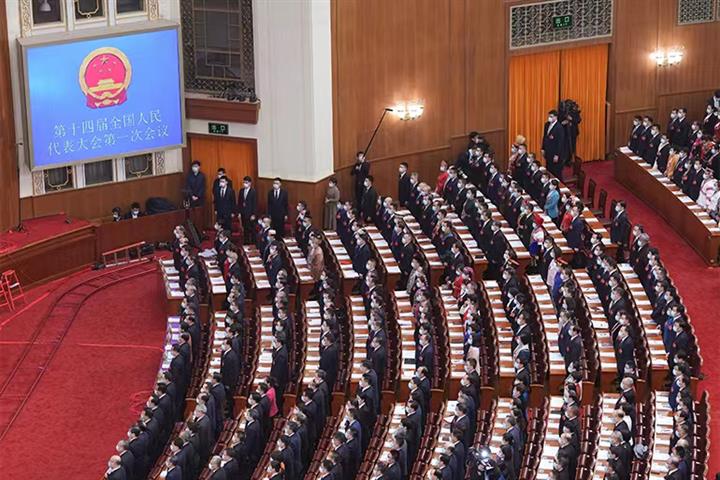 China’s Top Legislature Sets Economic Development Targets During Annual Meeting
China’s Top Legislature Sets Economic Development Targets During Annual Meeting(Yicai Global) March 6 -- China’s top legislature, the National People’s Congress, has set this year’s economic development goals in the government work report delivered by Premier Li Keqiang.
China aims to achieve an annual gross domestic product growth of around 5 percent this year, the Chinese Premier said at the annual meeting of the NPC yesterday.
The country also plans to create about 12 million new urban jobs, limit the consumer price index annual growth to about 3 percent, and keep the personal income increase in line with economic growth, according to the government work report.
Most provincial-level governments set their GDP growth targets to between 5.5 percent and 6.5 percent, while major developed provinces kept it around 5 percent, so it is not surprising that China set its GDP growth goal at about 5 percent, as it will also help improve social expectations and boost market confidence, Wang Jun, chief economist at Huatai Asset Management, told Yicai Global.
China’s economy will get back on track this year, so the annual GDP growth target set by the central government is instructive to local governments and can guide market entities’ expectations, Zhao Wei, chief economist at Sinolink Securities, said to Yicai Global.
The national government’s deficit-to-GDP ratio this year will likely be 3 percent, while local governments are allowed to issue a maximum of CNY3.8 trillion (USD549.6 billion) worth of total new special bonds, the government work report also showed.
The deficit-to-GDP ratio will rise 0.2 percentage point this year, adding to the factor that the GDP number itself will increase, this year’s deficit scale should be larger than the previous years, Luo Zhiheng, chief economist at Yuekai Securities, told Yicai Global.
A higher deficit-to-GDP ratio will provide the government more ammunition in tax and fee cut and ensure its own expenditures, thus boosting domestic demand to hedge against the falling overseas demand, he added.
The central government generally takes a 3 percent deficit-to-GDP ratio as a psychological safety line. The figure had never exceeded 3 percent before the Covid-19 pandemic broke out in 2020 when it set a record high of over 3.7 percent. It fell to 3.2 percent in 2021 and 2.8 percent last year.
China adopted proactive fiscal policies in the past five years but kept the overall deficit-to-GDP ratio below 3 percent and the government debt ratio around 50 percent in the period, the government work report showed.
This year, local governments’ new special bonds issuing quota will be CNY150 billion (USD21.7 billion) more than in 2022, which will help expand infrastructure investment, drive social investment, and stabilize demand in the short term, while optimizing the supply structure and raising the efficiency of economic and social operations in the medium and long term, Luo noted.
“Special bonds will likely be used in more areas this year, which will produce result early on and help to facility a large number of major projects to start construction as early as possible,” Luo added.
The amount of special bonds issued by local governments jumped quickly in recent years, it rose to CNY3.65 trillion last year from CNY100 billion in 2015. Considering the over CNY500 billion carried over from the quota balance of previous years, last year’s actual special bonds issuance exceeded CNY4 trillion for the first time.
Editors: Tang Shihua, Futura Costaglione